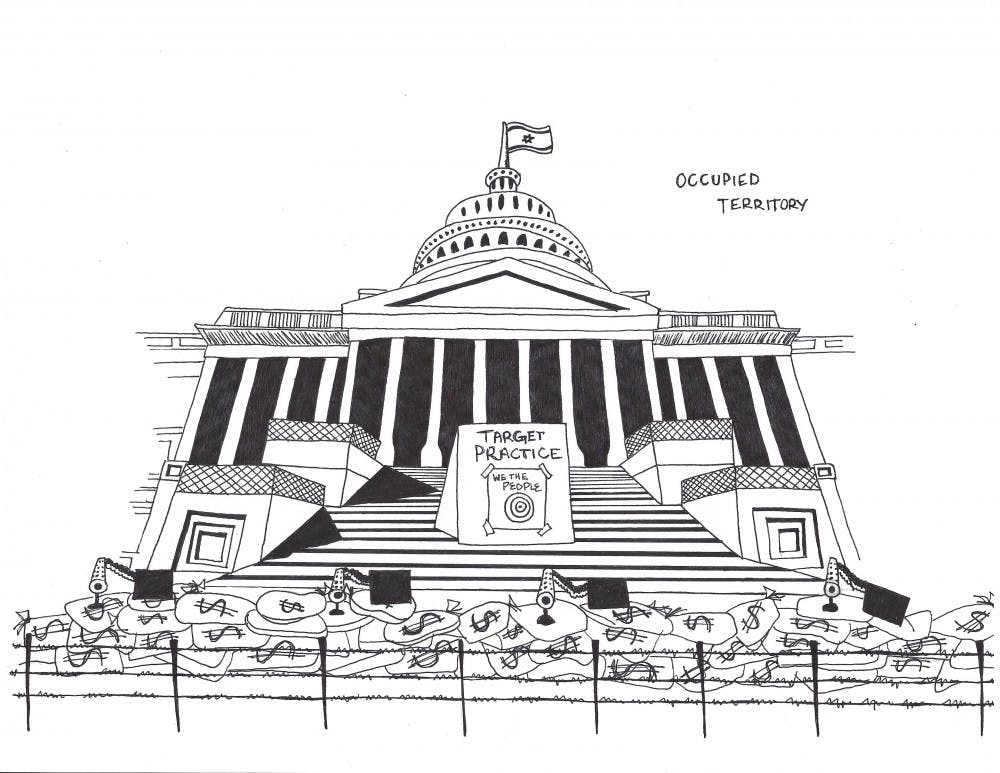The U.S. Congress is about to make a mistake.
A week ago, the American Civil Liberties Union sent a letter to Senate sponsors of a new bill called the Israel Anti-Boycott Act, voicing concerns that the bill would punish free speech and violate the First Amendment.
The bill amends the Export-Administration Act of 1979 and the Export-Import Bank Act of 1945, which, among other things, bars United States persons, typically companies, from supporting a foreign government’s request to boycott U.S. allies, according to the ACLU.
Congress enacted the legislation decades ago in response to the Arab state’s boycott of Israel and its settlement of the Occupied Palestinian Territories. Violators of the law face felony charges—a $250,000 maximum civil penalty, a maximum $1 million criminal penalty or 20 years in prison.
These penalties are nothing new.
However, the new bill extends the scope of boycotts to include those led by intergovernmental organizations, such as the United Nations and European Union.
As detailed in their statements, the bill’s bipartisan architects, Senator Ben Cardin, D-Maryland, and Rob Portman, R-Ohio, frame the legislation as a response to recent U.N. calls to boycott Israel and justify it as a measure to punish discrimination against people of a national origin.
Last year, the U.N. Human Rights Council adopted four resolutions regarding Gaza, the West Bank and East Jerusalem, reaffirming the national rights and dignity of the Palestinian inhabitants.
Specifically, the council called on companies to “avoid, identify, assess and address any adverse human rights impacts related to their activities” in the territories, according to the U.N. Human Rights Office of the High Commissioner.
Many watchdog groups and lobbyists, including the American Israel Public Affairs Committee, interpreted the resolutions as a U.N. call to isolate, boycott and shame Israel, calling it anti-Semitism repackaged, according to the AIPAC website.
Like the ACLU, the Editorial Board takes no stance on the ethics or effectiveness of the global Boycott, Divestment and Sanctions campaign to pressure Israel to end its 50-year occupation of Palestinian territory.
However, boycotting countries, their military occupations and even their people is a constitutional right. Courts have continually upheld that boycotts, whatever their motive, are protected under the First Amendment.
For example, in NAACP v. Claiborne Hardware, the Supreme Court affirmed the right of NAACP activists to organize an economic boycott of white-owned businesses in Mississippi.
Boycotts have been a vital part of American democracy and collective action since the Boston Tea Party.
As the ACLU noted in their letter, our founding father John Jay led a boycott against merchants engaged in the slave trade. The Montgomery Bus Boycott of 1955-56 turned the tide for the civil rights movement against Jim Crow. Our nation’s universities, including IU, led a boycott campaign against apartheid South Africa in the 1970s and 1980s.
The Israel Anti-Boycott Act follows a wave of recent legislation at the local and state level to criminalize one of the only peaceful means left for Palestinians to achieve national liberation. It makes it a felony to refuse business with Israel because of one’s political beliefs.
For these reasons, it is unjust, unconstitutional, imprudent and likely to fail.
Critics say that boycott campaigns are motivated by prejudice and malice toward Jews and their country. Even so, the solution is not to criminalize the instruments of civil disobedience.
As Louis Brandeis, eminent jurist and ardent Zionist, wrote in his concurring opinion to Whitney v. California, the remedy to bigoted speech is “more speech, not enforced silence.”
Editor's note: Comments that did not adhere to the IDS's terms of use have been deleted from this story. Please refrain from commenting unlawful, threatening, abusive, libelous, defamatory, obscene, pornographic, profane or indecent information. IU Student Media reserves the right to remove any remark found to violate the terms of use policies.




